How to travel for business while enjoying the experience and wanting even more
About 14 min reading time

If you need to travel frequently and you are getting stressed, frustrated and anxious there are are a couple of things you can do to improve the experience.
The most important thing to enjoy traveling is to remove all the stress from the experience. I’m going to tell you my tips to get there that let me be excited and trouble-less if I need to get a last minute flight tonight from Buenos Aires to London (13 hours).
Of course, I’ve started this article in the airport lounge in San Francisco, continued it during the flight and finish it in my layover in Lima heading back to Buenos Aires, where I live.
What got me into writing this post #
A few days ago Sara Souedian threw a challenge on twitter to speakers and frequent travelers that might help a lot of people get a more enjoyable experience. So Thanks to Sara you are now about to read mine. And before doing that you can read Sara’s tips.
We should totally do some sort of idea pool where each speaker/traveler shares their favorite travel tips/hacks 😍
— Sara Soueidan (@SaraSoueidan) July 20, 2017
What got me intro travel #

I’ve achieved the frequent flier status, not from the airline, but from family and friends. I’ve got that badge the day no one wished me good luck in my travels anymore, and they just wondered where in the world was I.
Thanks to my job -instructor, speaker, consultant- I’ve visited more than 55 countries —57 to be exact and yes, I’m counting them. That means that just in the last four years — since I started to count — I’ve boarded 250 flights, and I’ve slept in a hotel 556 nights (38% of the time). Fortunately, around 25% of that time was on vacations. And as you might expect, some of these vacations were entirely on miles 😀

I’ve even started doing these travel logs every year. Don’t ask me which tool I’m using as most people each end of the year: it’s a manual job!
Just imagine how many times I went through security, migrations, check-in counters, boarding processes, luggage waiting, luggage lost, missing flights, delayed flights, canceled flights and I’m still enjoying the experience. And I like to think I’m not crazy.
When speaking at conferences most of the times is the most enjoyable experience so you should do it too! Sometimes it doesn’t, and I compiled all those weird experiences in the article Being a speaker: Parts Unknown.
Getting enough destination Information #
I always do research on my destination, including:
- Transport System: where it goes and how it works
- How to get from the airport to the hotel (even if someone will pick me up)
- Currency: not the exact rate but an easy to remember rule (such as it’s 12 time your local currency), also I research on the coins and banknotes available.
- Scams: are there any common scams on that city?
- ATMs: are there ATMs at the airport? I always use ATMs to get local money; it’s cheaper and easier than exchange companies.
- SIM Cards: can I get a data plan on a SIM card at the airport? If not, it’s is possible somewhere else? Can I do roaming with a prepaid plan on my SIM card?
- Google Maps: I mark the hotel, the venue I need to go, and all the places I want to visit. And I save the map offline, just in case.
- Information: If you are invited, get all the information you might need: who is your contact, a phone number, the hotel name and address, a reservation number if available (even if they are picking you up).
- When I arrive I do a recognition phase, I get out of the hotel and see the surroundings looking for ATMs, grocery stores, public transport stations.
Prepare for the unknown #

Knowledge is king, and it’s important to understand as much as possible about how the travel process works, from reservations, check-in, boarding, luggage tags, migration rules and also from the destination, such as how to get from the airport to the hotel.
After you know, planning for the unknown is also important. It shouldn’t be a big planning, it shouldn’t take you more than 2 minutes searching on Google, but having the answer to some questions will reduce your stress while traveling and you will enjoy the experience much more.
I’ve been through most problems (not being deported yet! crossing fingers 🤞) so when I knew already what to do it was much less stressful. Examples of issues that might happen when traveling are:
- Flight Cancellations: is there any next flight from that airline the same day? From other airlines?
- Flight Delays: what should happen if you lost a connection flight?
- Flight Missed: you didn’t get to the gate on time to board the flight. What happens? What happens to your luggage if you are flying on there flight then?
- Transport to the Hotel: let’s say someone will be at the airport to pick you up, what happens if no one is there? let’s say you will take public transport, what happens if there is a strike that day or a malfunction or your flight is delayed and now it’s closed?
- Security Check: what happens if Security wants to check your luggage?
- Luggage Lost: what should you do if your luggage doesn’t appear in the infinite carrousel? When is the right time to do a claim? Where? What should you get from them?
- Hotel Reservation: what to do if the hotel doesn’t have you on file? or they say they are full and can’t accommodate you?
- Passport Lost: what’s the next step if you lost the passport while abroad? Do you have an scanned copy of it?
- Overbooked Flight: what if the airline tells you there is no seat for you even if you have a ticket and a boarding pass?
- Credit or Debit Card problems: what if an ATM doesn’t return you the card? What if someone makes a clone of your card? What are the next steps?
You really need to know all the answers in advance. Sometimes nothing goes wrong but you are still stressed just because the risk is there. If you know what to do, then you won’t be stressed when you get to the checkin counter, when your flight is delayed or when something goes wrong. You know exactly what’s the next step. Being less stressed also helps to get a solution faster both because you have a clearer mind and other people will be happier to assist you.
With the experience, you will get to know most of the answers, and on each new travel, you just need to learn some new things about the new destination.
Tips and Tricks #
Everything has to do to remove the hassle and stress of forget something or to don’t know what to do if a problem appears. Let me tell you what I do today on every travel.
Use a Traveller App #
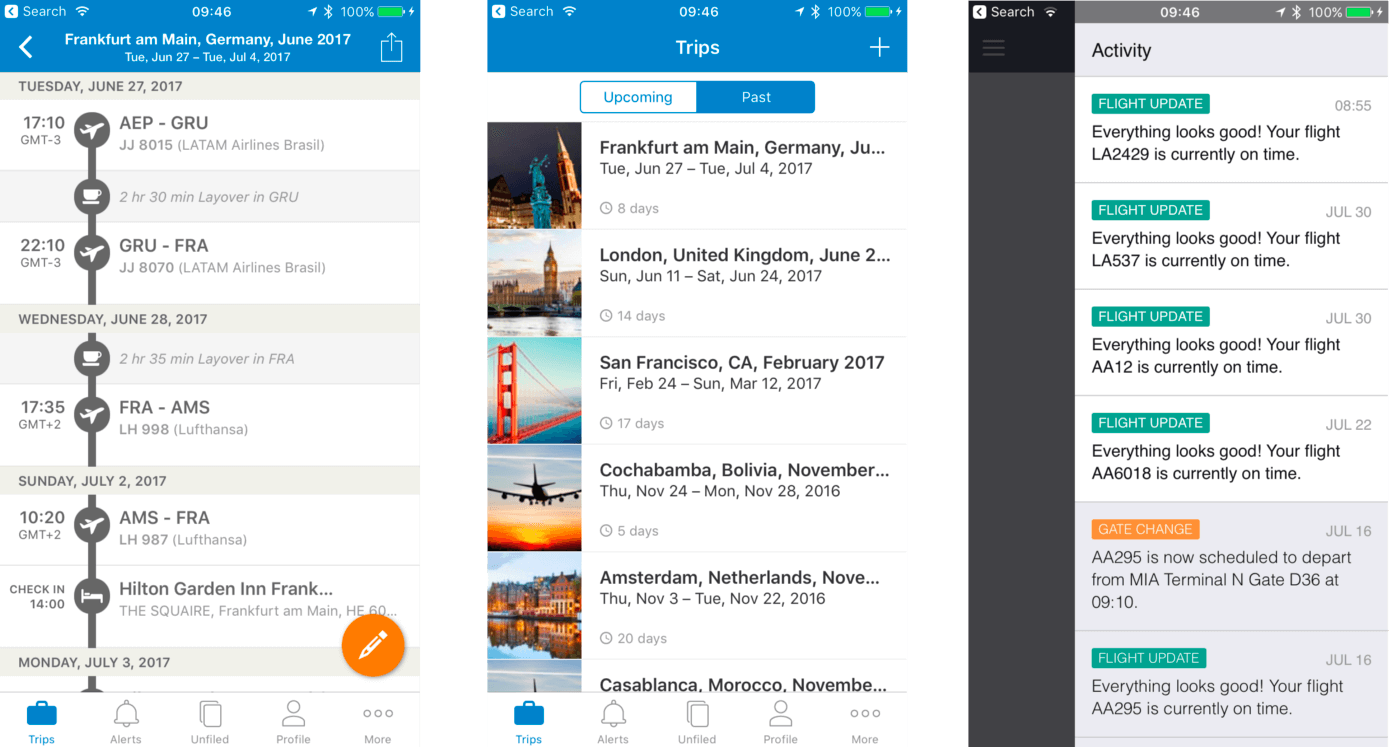
Remembering all your flight and hotel details can be a problem. Remove that stress using one traveler app, such as TripIt, TripCase or Google Trips. On those apps, you will have all the information you need, handy at any time. They will also send you alerts if a flight is delayed.
Also, these apps are useful to share that information with family, and they can even get email notifications of your arrivals. Lately, I like TripCase more than the others.
A great feature of those apps is that you will just forward the email from the airline, hotel or travel agency and they will parse the email and add all the information there. For me, it’s now an automatic process. Every time I’ve got a confirmation email, I forward it to TripIt and TripCase. Nothing else needs to be done.
Packing #
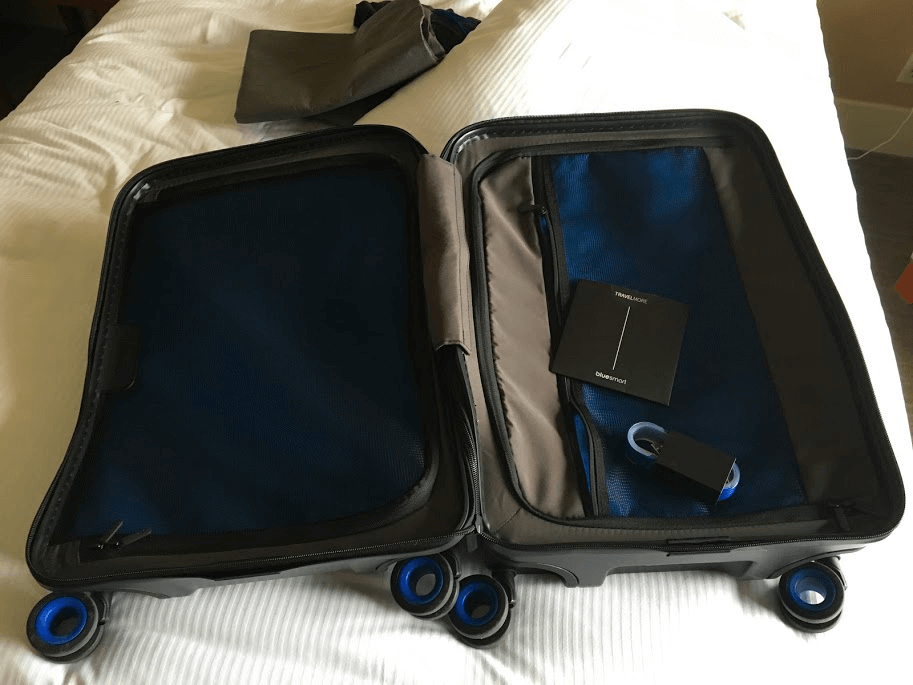
You’ve probably already heard the tip of travel light. Even if sometimes it’s impossible to, do your best effort. Remember you will be carrying that luggage for hours, and if you are going to buy some stuff at the destination, you need that space and weight.
Bear in mind that today every city has everything that you will need, so you don’t need to pack “just in case.” Do you need to pack your shampoo? If yes, don’t take that big bottle. Get a smaller one or just buy travel bottles and fill them with your liquids.
I have a couple of things that I used only for my trips, so they are always ready and packed in a container. That includes:
- Personal items: deodorant, nail clipper, shaving accessories, comb, etc. Don’t use those things at home. That’s for your travels! Don’t touch them! If you don’t have some item, I usually buy them on destination.
- Pills: I have a bunch of pills I know what they are and when to use them. Don’t accept pills from anyone else (well, doctors if necessary) but it’s important to don’t experiment when you are on the road. Aspirins, Paracetamol, Ibuprofen, etc. Remember not every of this things is free to buy in every country. I also have these pills in a travel container, and I don’t use them at home. I know they are always ready.
- Adapters and outlets: I have a universal travel adapter, also other one particular for Europe and other for the UK. A multi-outlet is also important to carry as some hotels seem to give you only one for all purposes. Everything should be ready to pack. We don’t want to realize that we left the cable at the office and it’s Sunday afternoon, and your flight departs in 4 hours.
- Cables: Finally, a couple -yes, a couple- of USB cables and lightning cables for iOS are necessary. I’m usually packing an HDMI cable lately. HDMI? Yes, so then I can connect it to the hotel TV and watch videos or Netflix on a big screen. I’m not using it every time (some big chains are changing TVs’ firmware, and you can’t use the input ports) but it’s light enough to carry it. I also carry a cable holder (next picture) that I use for my conferences so I know everything is one place and I don’t need to dig into my backpack to find that cable I need.
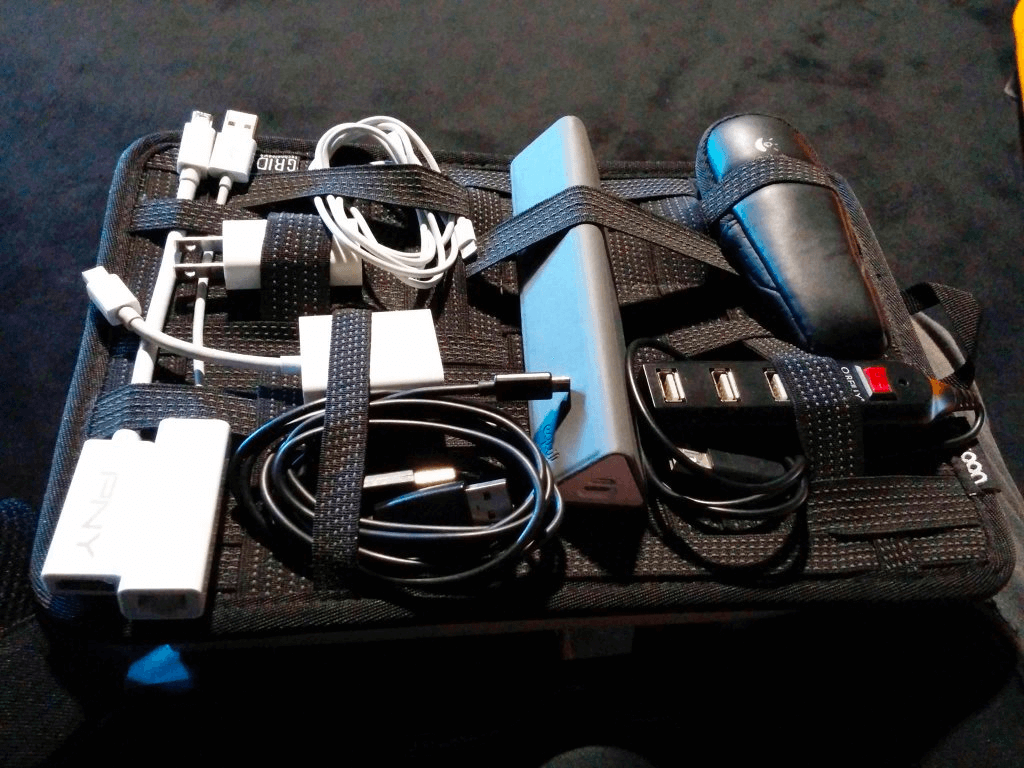
Cocoon Grid-IT cable organizers are pretty useful when you need to pack cables and small gadgets
For entertainment don’t pack every gadget you have or big heavy books. I used to pack a book for every travel. Then I realized I wasn’t reading them, so why making that book travel all over the world with you. Pack a Kindle if you have or a light pocket book. Don’t pack your iPad, your iPod Touch, your Kindle and your laptop. You also have your phone. Just pick maximum two gadgets. You are not going to use them!
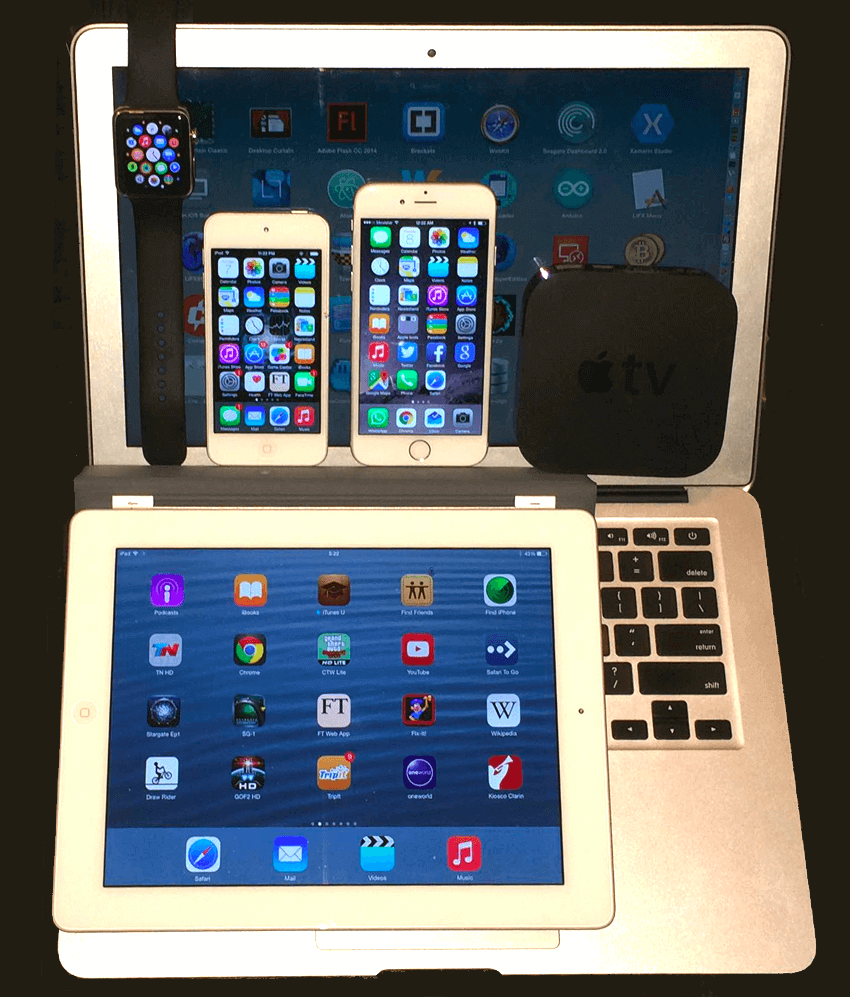
You don’t need to pack the whole family! I know they will miss you while abroad but they will be happy resting at home
Finally, you need to pack clothes for 1 or 2 days in the cabin luggage. Have in mind your luggage might not appear on time and it might appear a few days later. If you have a meeting, or an speaking engagement the next day after arrival you don’t want to appear with same clothes you used for travel, right? That tip helped me two times! BTW, don’t stress too much if that happens, usually luggage appears sooner or later and ask your credit card or insurance because you can even get some benefits there.
Passport and Document Wallet/Organizer #
This is a must! Your life will change the day you get one of these wallets.
Before this organizer: you pass migrations, you get your luggage, and the customs agent ask you for the passport. The passport? Sure, it’s here in my pock… ehh… it’s not there, ok, don’t panic. It should be somewhere, right? You search in the bag; you start to get nervous, you start to remember everything you’ve done in your whole life since you were a kid to find where you left the passport. Ok, you lost it. You lost the passport. The agent still waits. Then you start thinking: “should I call the embassy? What am I going to do now? Will I be able to get out of the airport” And then, you put your hand in your back pocket… it’s there. OMG, it’s there. Only 5 seconds have passed but time goes slower when you are on that kind of stress. And during travel, you will have several situations when you will need to get or see documents. Let’s make that stress-free.
After this organizer: your documents always go there. ALWAYS. Not matter what. Passport, visas, boarding passes. Good bye stress.

Travel Organizers or Passport Wallets have boarding pass size so you can store all your travel documents in one place
I use one passport and travel organizer from pacsafe, similar to this one available on Amazon. It has space for:
- Two passports: my actual one and the previous one with a visa I need to carry
- SIM Cards
- A pen (useful for filling forms)
- Credit cards and frequent flier / guest cards
- All my active SIM Cards (I have my local Argentinian phone number, a US T-mobile SIM card and a European Yoigo prepaid SIM card that I keep active every 6 months).
- Lots of pockets to store some money, migration forms and boarding passes
- Some currency just in case: I usually have 50 or 100 US dollars in change. Use US dollars or euros as they are currencies that can be exchanged easily everywhere. I never use that money; it’s part of the organizer now.
I never unpack or change the contents of this wallet. This is where my passports live while at home. So I don’t need to look over all my house to see where they are. I know they are there and ready to use on every new travel.
Reducing Jetlag #

The Sun is your friend when changing time zones. Use it on your own benefit; it’s even free!
If you are traveling east, jet lag is a problem (well, it’s also an issue if you travel west and the time zone difference is more than 5 hours). When going east, I avoid coffee and alcohol the day before the flight until one or two days after I’ve arrived. I also wake up earlier at home, usually 30 minutes or 60 minutes earlier per day.
I’m based in Buenos Aires, Argentina (GMT -3) so if I travel to Western Europe (4 to 5 hours east), I ended up waking up at 4 am or 5 am the day before the flight. And it’s not just waking up, go for a walk, if the sun is up, get outside, let your body know that it’s ok to be awake.
Your body will act weird while on jet lag, so it’s ok. If you wake up at 3 am, don’t stay in bed looking at the ceiling, do something that doesn’t need too much attention (don’t work). Watch a movie, go for a walk, go to the gym. And try to get some sleep later.
I avoid sleeping too early even if I want to sleep. Unless it’s essential, I avoid naps as well, but if you are used to naps, some people say that short ones while in jet lag might help. Not for me.
At the airport #

Here some tips I use while at the airport
- Do an online checkin, more useful if you don’t check luggage.
- Arrive early. As early as possible. You will do fewer lines at check-in, fewer lines at security (sometimes) and you won’t have the rush in your mind that will add stress to all the experience. You don’t want to sit down in the plane after running for 10 minutes.
- Try to get access to lounges. Relax a couple of minutes on a lounge if you are going to travel a lot. I’m not saying you should pay USD50 for an entry. Get a credit card with access to lounges on airports you use frequently; try to get status on your airline; buy a Priority Pass card. You will then be able to sit down, charge whatever gadget you didn’t charge at home, download that movie that Netflix was still downloading, and have some food in the meantime.

At Doha Airport, the Qatar Airways First Class lounge is not a lounge, it’s closer to a personal palace
- Prepare for security. Pack your hand luggage, so everything that needs to take apart is easy to access, such as laptop or liquids. When I arrive at the security lane where the bins are waiting for me my shoes are in my hands, my computer is already out, and my phone, wallet, and watch are already inside the hand luggage. After you passed security, check that your things are in: computer, documents, phone, watch. Don’t re-wear everything at the gate. Do it right there to make sure you have everything.
- Prepare for migrations: You know migrations can be a problem. I’ve had 2–3 hours wait in Mexico 🇲🇽, Moscow 🇷🇺 and Dammam 🇸🇦, just to give some examples. Don’t lie. Avoid using wrong words and have something to do while waiting on the line (book, kindle, phone).
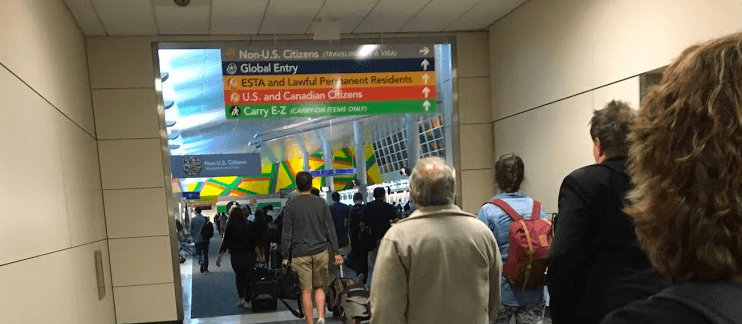
Prepare yourself for migration. Don’t stress. Even if there is an infinite line and only 10% of the counters are open. You can’t change it, so it’s better to keep yourself relaxed.
- Get breakfast, lunch or dinner at the airport. Unless you are flying in business or first class (I’ve been lucky so many times with free upgrades!), try to avoid eating on the plane. Do you think restaurants at the airport are expensive? How expensive is not feeling well during a 12 hours flight or not sleeping well enough? I remember after a long trip I had to eat light for two days at the destination. Not anymore since I don’t eat on the plane in coach. Or I eat just the minimum (you don’t want to be hungry!)
- Buy water. You want to drink water in the place. A lot. While you can get that from the cabin crew, it’s easier if you have your bottle always at hand reach. Be careful and ask first: some flights (mostly going to the USA) won’t let you get liquids on board even if you buy them after security.
- Prepare for boarding: Don’t do worthless lines. Everybody will go to the same plane. If you want to do a line, make sure you know what you are doing, you know your line or your group number. You don’t want to be those people staying at the front of the line for 30 minutes to realize it’s the priority lane and you don’t have priority boarding access. Have your boarding pass ready (or your phone with the boarding card on the screen) and if it’s an international flight, have the passport on your hand.
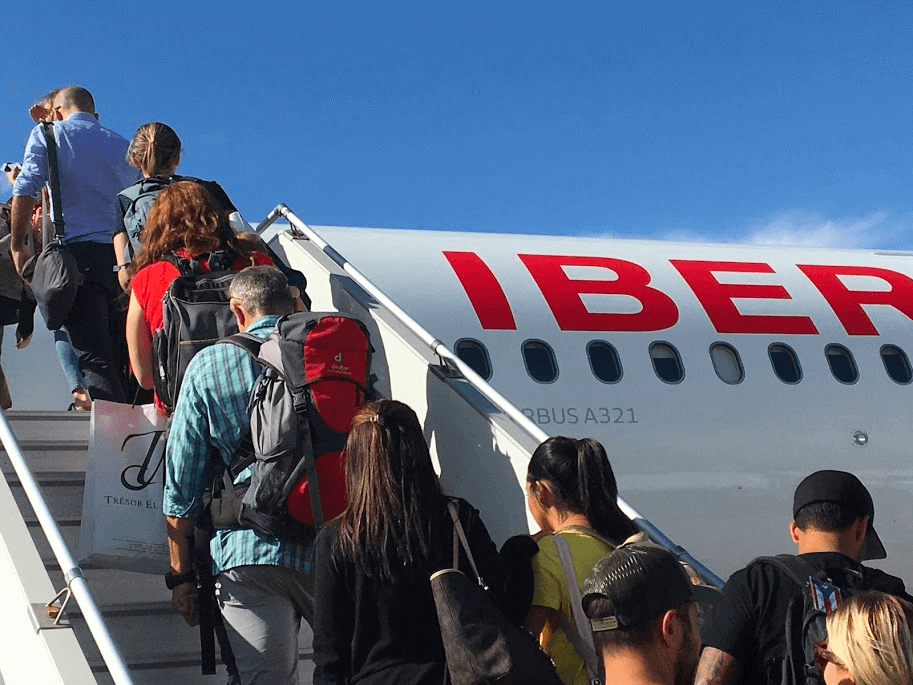
There are lines you can’t avoid. But doing a line to board first is one you can avoid. Do it!
On the plane #
When I’m on the plane, I relax. My hand luggage has everything I need in my seat ready: headphones, phone, water, something to read or use, glasses.
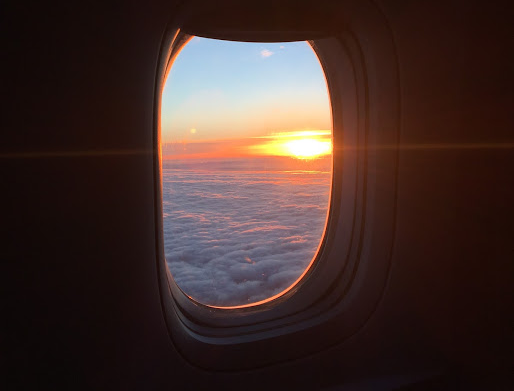
I already mentioned that unless I’m flying business or first class, I try to avoid airline food as much as possible. I eat early in the airport lounge or at a restaurant. I also pack some snacks always handy, some sugar-free candies and some fruit bars or something similar.
I usually listen to music or watch a movie/tv show on the entertainment system, on my phone (you should download something on Netflix offline) or on my laptop. When I feel I’m falling asleep, I wear a sleep eye mask, music on the headphones and that’s all.
Noise-Cancelling Headphones #

They are expensive. But believe me, after three flights you will feel that you have the money back. I’m using Bose QuietComfort 20 Acoustic Noise Cancelling Headphones that I preferred over the big ones that were giving me some pain around the ear after waking up. I love the ones I have. You need to charge them before the flight, or now I carry a short USB cable with them, so when you are on a plane with WiFi, the USB port is usually near the headphone jack: problem solved.
I can’t tell you how much of a difference you will feel wearing these headphones. The flight and sleep are completely different. I remember sometimes I didn’t even realize that we were about to depart. I was watching a movie and realizing “what happens? Oh, we’ve just taken off! Didn’t realize it.”
Get one. Really. It worth the money.
At the hotel #
My first steps at the hotel are usually:
- Put some local currency in my wallet and the rest in a local secure storage
- Split my credit cards. I don’t get out of the hotel with all my cards
- Store my passport wallet (with money and credit cards) in the safe or in a suitcase I can lock (I’m using the “smart luggage” BlueSmart)
- Unpack only clothes I will use on that hotel
- Get plenty of water and some snacks
Stay with one airline group #

Unless you don’t have other option, always stay with the same group or airlines (OneWorld, Star Alliance or SkyTeam) and if possible the same airline. Not just because of miles, you can get, but mainly for the benefits, you can get if you travel frequently. With four intercontinental flights in the year can sometimes get you in a status with access to certain advantages, such as lounge access, priority check-in, priority boarding, free advance seat selection, upgrades and priority of not being rejected on an overbooked flight.
If you travel more than the usual as I am, then using the same airline or group is mandatory. Think about your last experience flying and let me explain how it was the experience on the flight I’m currently on, step by step:
- I have booked a cheap economy flight as any other traveler
- Because I have the high tier as a frequent flyer, I can log in and select extra space seats for free near the exit. That means that not only I can fly more comfortable, but also I will exit first from the plane and be first for migration lines.
- I go directly to First Class check in when arriving the airport. Sometimes it’s a different place with sofas to wait.
- My luggage is tagged as Priority so that they will appear first in the carrousel
- I have Priority Security at some airports, so I don’t do those big lines
- After security, I have access to the lounge; food, wifi, drinks.
- I go to the gate, and board whenever I want without lines in the Priority Line, if I do it first then I have the whole cabin for me to put my luggage (anyway, if I have two pieces, one will go under the seat in front of me, be nice!)
- Sometimes, like today, I’ve received an upgrade to business or first class, for free. So I will have much better meals, a more comfortable seat, I can sleep the whole flight, or work comfortably.
I simplified the whole list of benefits, but I guess you’ve got the idea. For the same price everyone else is paying, my experience is much less stressful.
So if you travel a lot, use the same airline. Pick the best airline and group for you.
If some one else is buying the tickets (such as a conference organizer) tell them about your preference; tell them that even if it’s more expensive, you may be able to pay the difference to use the airline or your choice. Or just buy it yourself and ask for reimbursement if you have the credit or money to do it.
Just a warning: you need to travel a lot to get high status. But you never know if your next flight is when you will start that life!
You can also travel stress-free! #

These are my tips to travel without stress and relaxed; take the ones you think will make a difference on you. Do you have more tips? Add your own in the comments section or write your article!

 by Maximiliano Firtman
by Maximiliano Firtman